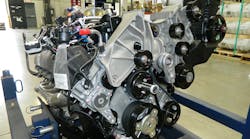You can’t expect to feel good and stay healthy without eating well and getting the exercise and sleep you need. These are the basic best practices for maintaining a human body.
Of course, there are also best practices for maintaining vehicles. As a fleet manager, you know maintenance is key to peak performance and a vehicle’s longevity. When it comes to propane autogas vehicles, some fleet owners hesitate because they may not currently have technicians trained on propane fuel system upkeep. Fortunately, this type of vehicle maintenance is easy to learn.
Online and hands-on
Technicians can be trained to service propane vehicles through online courses or in-person workshops. There are many hands-on workshops for technicians and customers on propane vehicles available through.
The first thing to consider is that propane isn’t something brand new: It has been around for more than 100 years fueling vehicles. Over 27 million vehicles worldwide use propane autogas. It’s a readily available, safe and economical fuel with simple maintenance requirements. For example, the engines require less oil by volume than diesel and no additional diesel emission fluids. There are no after-treatment items to service, such as maintenance parts and fluids, because propane’s chemical properties allow it to power an engine while reducing the emissions released into the atmosphere.
There are a few differences to keep in mind:
- When depressurizing the fuel lines in a propane vehicle, follow manufacturer-recommended procedures. Although isolated, fuel lines typically maintain some amount of pressure after shutdown.
- There is never a need to drain the propane from the tank itself and go inside for any regular maintenance, as all filters requiring regular maintenance are external.
- Propane fuel systems require two additional filters to be changed at the 50,000-mile interval. One is a pre-filter in the system’s filling line to prevent any contaminants from entering the tank and the other is in the supply line between the tank and the engine.
- Wear appropriate personal protection equipment, such as propane safe gloves and safety glasses, whenever servicing the fuel system.
- And just like with any vehicle, refer to the vehicle owner’s manual for regular maintenance. Follow the manufacturer’s recommended oil change intervals, even though your oil will appear much cleaner because propane reduces the amount of suspended carbon in the oil. Continue with basic maintenance at proper intervals just like you would with a gasoline and diesel vehicle.
You can learn more about propane vehicle maintenance here.



